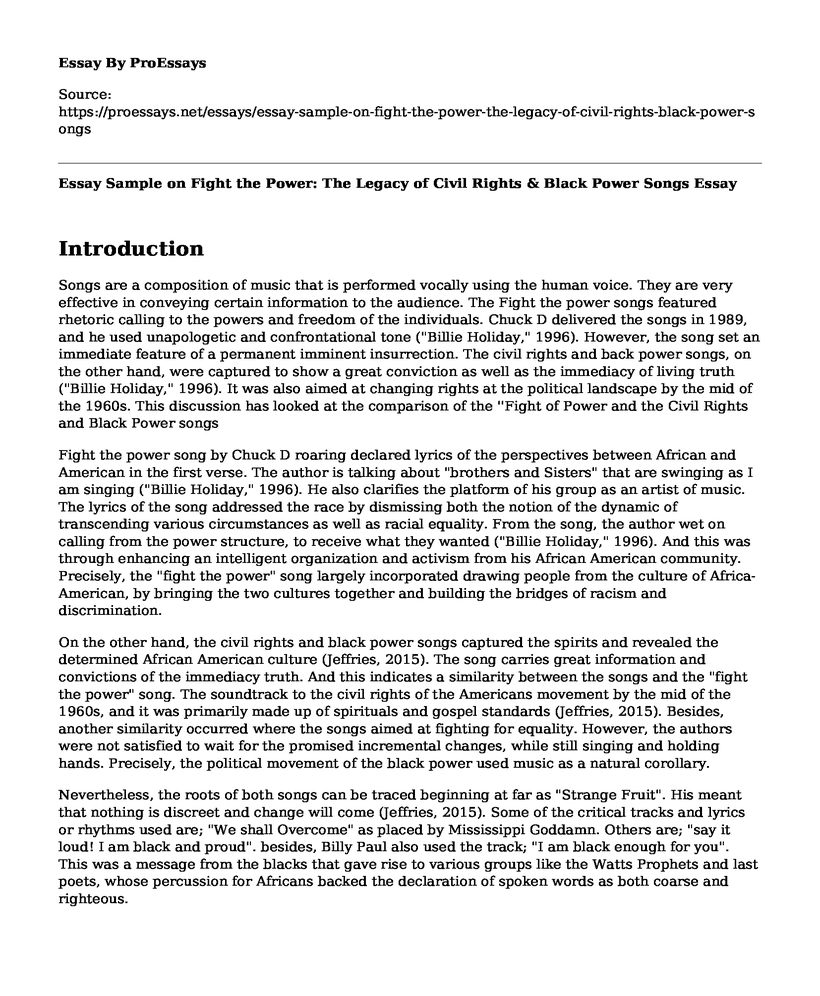Introduction
Songs are a composition of music that is performed vocally using the human voice. They are very effective in conveying certain information to the audience. The Fight the power songs featured rhetoric calling to the powers and freedom of the individuals. Chuck D delivered the songs in 1989, and he used unapologetic and confrontational tone ("Billie Holiday," 1996). However, the song set an immediate feature of a permanent imminent insurrection. The civil rights and back power songs, on the other hand, were captured to show a great conviction as well as the immediacy of living truth ("Billie Holiday," 1996). It was also aimed at changing rights at the political landscape by the mid of the 1960s. This discussion has looked at the comparison of the ''Fight of Power and the Civil Rights and Black Power songs
Fight the power song by Chuck D roaring declared lyrics of the perspectives between African and American in the first verse. The author is talking about "brothers and Sisters" that are swinging as I am singing ("Billie Holiday," 1996). He also clarifies the platform of his group as an artist of music. The lyrics of the song addressed the race by dismissing both the notion of the dynamic of transcending various circumstances as well as racial equality. From the song, the author wet on calling from the power structure, to receive what they wanted ("Billie Holiday," 1996). And this was through enhancing an intelligent organization and activism from his African American community. Precisely, the "fight the power" song largely incorporated drawing people from the culture of Africa-American, by bringing the two cultures together and building the bridges of racism and discrimination.
On the other hand, the civil rights and black power songs captured the spirits and revealed the determined African American culture (Jeffries, 2015). The song carries great information and convictions of the immediacy truth. And this indicates a similarity between the songs and the "fight the power" song. The soundtrack to the civil rights of the Americans movement by the mid of the 1960s, and it was primarily made up of spirituals and gospel standards (Jeffries, 2015). Besides, another similarity occurred where the songs aimed at fighting for equality. However, the authors were not satisfied to wait for the promised incremental changes, while still singing and holding hands. Precisely, the political movement of the black power used music as a natural corollary.
Nevertheless, the roots of both songs can be traced beginning at far as "Strange Fruit". His meant that nothing is discreet and change will come (Jeffries, 2015). Some of the critical tracks and lyrics or rhythms used are; "We shall Overcome" as placed by Mississippi Goddamn. Others are; "say it loud! I am black and proud". besides, Billy Paul also used the track; "I am black enough for you". This was a message from the blacks that gave rise to various groups like the Watts Prophets and last poets, whose percussion for Africans backed the declaration of spoken words as both coarse and righteous.
Conclusion
In conclusion, both the ''Fight of Power", and the Civil Rights and Black Power songs complement lyrics for both economic and political liberations, as well as introduced freedom powers to Africans and Americans (Jeffries, 2015). They also created spaces for a new level of frankness and openness about the blacks and whites, and their freedom without discrimination ("Billie Holiday," 1996). Besides, the songs reflected the early promise of movements in the 1960s, through their deep message and their ability for conviction by; lyrics or rhythms.
References
Billie Holiday. (1996). Choice Reviews Online, 33(06), 33-3227-33-3227. doi: 10.5860/choice.33-3227
Jeffries. (2015). What's Old Is New Again: Recentering Black Power and Decentering Civil Rights. Journal Of Civil And Human Rights, 1(2), 245. doi: 10.5406/jcivihumarigh.1.2.0245
Cite this page
Essay Sample on Fight the Power: The Legacy of Civil Rights & Black Power Songs. (2023, Mar 29). Retrieved from https://proessays.net/essays/essay-sample-on-fight-the-power-the-legacy-of-civil-rights-black-power-songs
If you are the original author of this essay and no longer wish to have it published on the ProEssays website, please click below to request its removal:
- Essay Sample on Criminal Evidence and Its Types
- Annotated Bibliography: Gun Control
- Strict Product Liability: Calles v. Scripto-Tokai Corp. Case Paper Example
- Legalization of Marijuana Production for Individual Use Essay Example
- Court Management: Ensuring Equal Justice and Timely Dispute Resolution - Essay Sample
- Recidivism: Prior Conviction, Reoffending, and Delinquent Action - Essay Sample
- Paper Example on Online Child Sexual Abuse: An Increasing Global Epidemic







